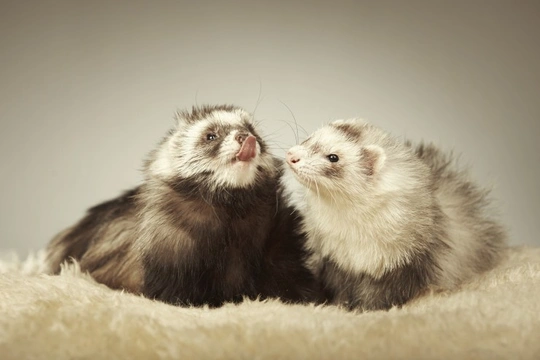
What you need to know about ferrets and coat shedding
Just like most other furry pets such as cats and dogs, ferrets too shed their coats over time, shedding a small amount of fur over the course of the year and going through larger and more prolific seasonal sheds as well. A certain degree of coat shedding, particularly in spring and autumn, is totally natural for your pet, but losing fur or other issues with the coat can also potentially indicate problems.
In this article, we will look at ferrets and their normal coat shedding cycles, some of the potential problems that can arise with shedding, and how to keep an eye on things! Read on to learn more.
Regular shedding
Just like most other furry mammals, ferrets grow new hair and shed the old on a continual basis, and when you stroke or play with your pet, you will probably find a few shed hairs come off them every time! This is normal and a simple fact of ferret ownership, and the shedding hair will be less prolific than you might notice happening on larger animals, or those with long hair!
Seasonal shedding
As well as the regular process of hair shedding and regrowth, most ferrets will go through a heavier shed for a week or two at a time a couple of times a year, usually in spring and autumn. This seasonal shed allows your pet to get rid of their old coat that was better suited to the season just passed, and grow in a more appropriate coat for the coming months, and will usually happen in autumn when your pet starts to grow their winter coat, and in spring when they will start to lose it!
Your ferret’s seasonal shed will be much more pronounced if they live outside and are more exposed to the elements, and if your ferret’s enclosure is inside of the home and your ferret never or rarely goes outside, they may not display a noticeable seasonal shed at all.
How light affects coat growth and shedding cycles
Both light and heat affect the seasonal shedding cycles of your ferret’s coat, which is why ferrets that live outside will have more marked coat growth and shedding cycles than those that live indoors. However, even indoor ferrets are exposed to natural light, which is why even ferrets that consistently live within a home that has a constant temperature may well display a seasonal shedding pattern too.
Abnormal shedding
Because the coat of the ferret is short and not particularly fluffy, hair does not tend to come off them in clumps or lumps as can often occur in double-coated dogs and other pets. If your ferret is losing handfuls of fur, shedding heavily out of season or even beginning to display bald patches, this is unlikely to relate to a normal shed, and may indicate a problem that you will need to speak to your vet about.
Thyroid and hormonal issues can all lead to abnormal shedding, as can stress and the mating season as well!
Potential problems
As mentioned, ferret’s coats are not usually thick or heavy enough to make a huge mess, or turn into tumbleweeds of fur throughout the house! However, as ferrets groom themselves, they will naturally ingest a small amount of the loose fur that has come off their coat when they lick themselves, which will generally pass out through their digestive system in the normal manner.
In some cases, your ferret may ingest a significant amount of fur within a short period of time, which can then form into a clump or mat in their digestive system, and potentially lead to a blockage.
If your ferret appears to have a taut, hard abdomen, goes off their food and is constipated, this is something to consider, and you should speak to your vet promptly as your pet may need to have help to pass the blockage, and just leaving it to work itself out can be potentially fatal.
Grooming your ferret
Ferrets usually lick and groom their own coats, and the coats of the other ferrets that they live with, which helps to bond the group and keep all of your pets getting on! It is not necessary to brush or groom your ferret daily in order to keep them in good condition, but you might want to consider investing in an appropriate brush for your pet and giving them a quick going over now and then, particularly when they are going through a seasonal shed.
This can help to keep your ferret from ingesting too much hair to process, and can also give you a valuable opportunity to check your ferret over for any odd lumps, bumps or problems that you might otherwise miss-however, many ferrets will view this as a game an want to fight or make off with the brush, and so it is best to try to get your pet used to this while they are still young!



